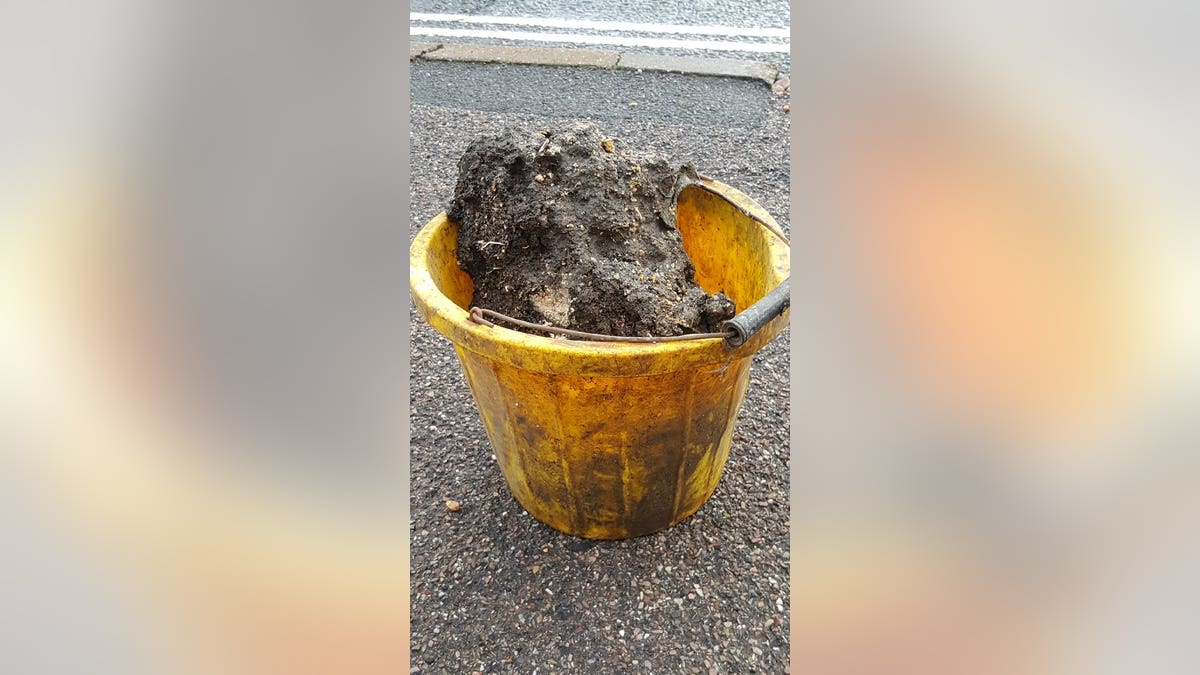Giant mass of fat and garbage blocking sewer in England is discovered
A 'fatberg', a mass of hardened fat, oil, and baby wipes, measuring some 210 feet long, was found in the town of Sidmouth, England.
The mammoth task to clear a giant “fatberg” blocking a sewer in a popular southwestern English resort town is underway and officials said it will likely take months to remove the revolting 210-foot fat mass.
The congealed “monster” of fat, oil, wet wipes, and other trash was discovered in the sewers of the coastal town of Sidmouth in December. Officials said it would likely take about eight weeks to remove.
On Tuesday, staff from South West Water descended into the sewer to remove the first chunk of the “fatberg” and 3D scans were taken of the “unwanted Christmas present,” the BBC reported.

The first chuck of the 210-foot “fatberg” in Sidmouth, England was brought to the surface as sewer workers began their mammoth task of removing it. (South West Water)
The chunk was brought out in a yellow plastic bucket and a wet wipe poked out of one side of the grey-mess.
GIANT ‘FATBERG’ BLOCKS SEWER IN POPULAR ENGLISH RESORT TOWN
On its website, the water provider said sewer works will endure weeks of manual labor “attacking the fatberg bit by bit with shovels and pickaxes” alongside a high-pressure jet to clear the colossal mass.
“Fortunately, the fatberg has had no impact on Sidmouth’s excellent bathing water quality and has been discovered in good time,” South West Water said. “But it doesn't always end this way.”

High levels of hydrogen sulfide and methane in the air means it’s too unstable to risk taking cameras down to film the removal, the water provider said. (South West Water)
High levels of hydrogen sulfide and methane in the air means it’s too unstable to risk taking cameras down to film the removal, the water provider said.
“It is the largest discovered in our service history and it will take our sewer team around eight weeks to dissect this monster in exceptionally challenging work conditions,” Andrew Roantree of South West Water said last month. “Thankfully it has been identified in good time with no risk to bathing waters.”
Charlie Ewart, 51 from Plymouth, is said to have found the fatberg while carrying out an inspection of the sewers in Sidmouth.
“I saw it and thought ‘what on earth?’ it was completely unexpected,” he told Plymouth Live. “It's really eerie in that bit of the sewer and it does look like something out of a horror scene, all congealed and glossy and matted together with all kinds of things."

In this photo released Tuesday Jan. 8, 2019, by Britain's South West Water company, showing part of a "fatberg", a mass of hardened fat, oil and baby wipes, measuring some 64 meters (210 feet) long, in the town of Sidmouth, England. The fatberg is blocking a sewer in the southwestern English town, and will take a sewer team around eight weeks to dissect and dispose of the obstruction. (South West Water via AP)
He told the Guardian that they are looking forward to getting it out.
CLICK HERE TO GET THE FOX NEWS APP
A “fatberg” forms after baby wipes congeal with fats, oil, and grease, gradually forming a hard mass.
"This is why we advise people to only flush the 3Ps – pee, paper and poo – down the loo, and dispose of cooking waste in the bin not the sink!" South West Water said.
In 2017, an 820-foot fatberg was found in sewers beneath Whitechapel in east London. A chunk of that later went on display at the Museum of London, nestled inside transparent boxes.









































